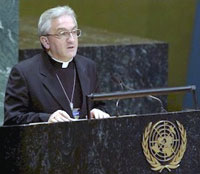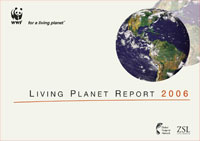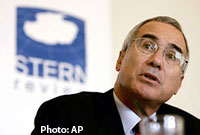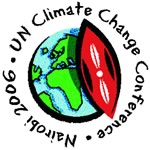
News |
- Pope Appeals for "Ecological Conversion"
- Poplar/Nanowin River Protection Urgent
- OlyWest Investigation, Hearing Delay?
- Hog Barns Moratorium, Water Protection Review
- Caribou At Risk - BC and Ontario
- 2006 Living Planet: Humanity Overdrawn
- Get Serious About Global Warming: The Stern Review
- Disappointment: 2006 Manitoba Protected Areas Grade
- More Manitoba Hydro Power to Minnesota
- Action Day Kicks Off Kyoto Sessions
- Species at Risk Workshop for Aboriginal Peoples
- Water Pipeline Hearings
| Pope Appeals for "Ecological Conversion" | 23 November 06 |
 The Vatican is calling for an "ecological conversion" so that sustainable development can take place. This was the message of Archbishop Celestino Migliore, the Pope's permanent observer to the United Nations, who addressed the UN General Assembly's committee discussing sustainable development and ecology on October 25, 2006. The Vatican is calling for an "ecological conversion" so that sustainable development can take place. This was the message of Archbishop Celestino Migliore, the Pope's permanent observer to the United Nations, who addressed the UN General Assembly's committee discussing sustainable development and ecology on October 25, 2006."Even in the context of its fast transition and mutation, our economy continues to rest basically upon its relation to nature," the archbishop said. "Its indispensable substratum is soil, water and climate; and it is becoming rapidly ever clearer that if these, the world's life-support systems, are spoiled or destroyed irreparably, there will be no viable economy for any of us." The Holy See official said, "the world needs an ecological conversion so as to examine critically current models of thought, as well as those of production and consumption." View the October 26, 2006 Zenit article Source: Zenit News Service - The World Seen From Rome
|
|
| Poplar/Nanowin River Protection Urgent | 21 November 06 |
 The Natural Resources Defense Council is calling on citizens everywhere to support Poplar River's plans for management and stewardship of their traditional lands. In an effort to spur action by the Manitoba Government to permanently protect the Poplar/Nanowin Rivers Park Reserve (currently under interim protection), the NRDC is providing a new opportunity for supporters to 'Take Action'. The Natural Resources Defense Council is calling on citizens everywhere to support Poplar River's plans for management and stewardship of their traditional lands. In an effort to spur action by the Manitoba Government to permanently protect the Poplar/Nanowin Rivers Park Reserve (currently under interim protection), the NRDC is providing a new opportunity for supporters to 'Take Action'.Supporters can send an e-mail from the NRDC Heart of the Boreal Forest BioGem website to Manitoba Premier Gary Doer and urge him to permanently protect Poplar River First Nation traditional lands. Previous appeals have generated tens of thousands electronic letters. Poplar River First Nation completed its land use plan in 2005 and formally asked for permanent protection of its territory in March 2006. Yet despite repeated promises to protect Poplar River's lands - an area part of a nomination for UN World Heritage Site status - the Manitoba government has failed to act on its commitment. Poplar River's lands are within the NRDC's 'Heart of the Boreal Forest Biogem'; part of the NRDC's BioGems campaign to safeguard special places on the planet. 
Visit NRDC's Heart of the Boreal Forest BioGem webpage Send a letter to Manitoba Premier Gary Doer for the Poplar/Nanowin River Protection View previous Manitoba Wildlands' news items: May 26, 2006 - Poplar River Launches Plan, Seeks Protection January 26, 2006 - NRDC Issues Boreal BioGem Alert January 19, 2006 - Asatiwisipe Aki Releases Lands Plan Source: Natural Resources Defense Council
|
|
| OlyWest Investigation, Hearing Delay? | 21 November 06 |
 OlyOpp's August 2006 letter to the Association of Professional of Engineers and Geophysicists of Manitoba (APEGM) has caused the APEGM to confirm that it has launched a conflict-of-interest investigation into Earth Tech, the firm that conducted the environmental assessment for the proposed OlyWest hog plant. This could potentially delay Clean Environment Commission (CEC) hearings slated for next year. OlyOpp's August 2006 letter to the Association of Professional of Engineers and Geophysicists of Manitoba (APEGM) has caused the APEGM to confirm that it has launched a conflict-of-interest investigation into Earth Tech, the firm that conducted the environmental assessment for the proposed OlyWest hog plant. This could potentially delay Clean Environment Commission (CEC) hearings slated for next year. OlyOpp is the coalition of business groups that opposes OlyWest's proposed hog processing facility being located in St. Boniface industrial park. The group contends that Earth Tech is in a conflict of interest because it was contracted by OlyWest both to assist with the design and construction of the plant, as well as prepare the environmental assessment of the facility. Earth Tech considers the OlyOpp allegations a nuisance, noting the APEGM is required to investigate all complaints about its members, regardless of whether the concerns are legitimate. OlyWest is not the first project Earth Tech has both designed and assessed; the firm drew up the plans for Simplot Foods in Portage la Prairie and also conducted the environmental assessment of the project. Earth Tech is also involved in the upgrades for the Winnipeg north end wastewater treatment centre, which are integral to the OlyWest proposal. OlyOpp has asked the CEC to delay hearings until the APEGM completes its investigation. Commission chairman Terry Sargeant has said that if there is an investigation of Earth Tech, the commission might have to consider delaying the public hearings. View the November 17, 2006 CBC article View the November 17, 2006 Winnipeg Free Press article (DOC) View the November 18, 2006 Winnipeg Free Press Editorial (DOC) View the November 15, 2006 letter from OlyOpp to the CEC (DOC) Sources: CBC, Winnipeg Free Press
|
|
| Hog Barns Moratorium, Water Protection Review | 17 November 06 |
 Manitoba Conservation Minister Stan Struthers has ordered a 'temporary pause' on new or expanded hog barns in the province to allow the Clean Environment Commission (CEC) to conduct a public review of the Manitoba's 'Water Protection Plan', and to fulfill a recommendation to review the hog industry. Manitoba Conservation Minister Stan Struthers has ordered a 'temporary pause' on new or expanded hog barns in the province to allow the Clean Environment Commission (CEC) to conduct a public review of the Manitoba's 'Water Protection Plan', and to fulfill a recommendation to review the hog industry. No announcement has been made as to whether the CEC hearing for the proposed OlyWest Hog Processing Plant in Winnipeg will proceed as planned. Manitoba Conservation also announced the third phase of its 'Water Protection Plan'. To alleviate confusion associated with announcing a new plan already in its third phase, the press release contained a backgrounder to describe actions attributable to the first and second phases. Manitoba's Water Protection Plan was never referred to publicly before November 8, 2006. The 'Water Protection Plan' is also part of the review by the CEC. The Terms of Reference for the CEC review of the hog industry are available on the CEC web site. No report or Terms of Reference have been released for the 'Water Protection Plan' review. Gaile Whelan Enns, director of Manitoba Wildlands, indicated, "We need a pause in the OlyWest review and CEC hearings too. It is unfortunate the Minister did not put a scientific and environmental basis to the review of the hog industry. The limited terms of reference assume the outcome. We need real hearings with intervener funding." View three November 8, 2006 Manitoba Government press releases: 383, 384, 385 Visit Manitoba Conservation's Environmental Livestock Program webpage View the Minister of Conservation's Terms of Reference for the CEC Investigation (PDF) View the Proposed Amendments to the Livestock Manure & Mortalities Management Regulation (PDF) View the November 10, 2006 Winnipeg Free Press article (DOC) View the November 14, 2006 CBC article Source: Government of Manitoba
|
|
| Caribou At Risk - BC and Ontario | 17 November 06 |
 In Ontario and British Columbia, conservation groups are raising the alarm; without protection of habitat, caribou will not survive. In Ontario and British Columbia, conservation groups are raising the alarm; without protection of habitat, caribou will not survive.In Ontario, CPAWS Wildlands League, with the assistance of Sierra Legal, filed an application under Ontario's Environmental Bill of Rights for a formal review of the current guidelines for protecting caribou. Woodland caribou are predicted to become extinct within the next 80 years. The Wildlands League is calling on Ontario's government to halt logging and road building in woodland caribou habitat. In BC, the Sierra Club of Canada is reacting with outrage to a draft provincial recovery plan for British Columbia's mountain caribou that recommends predator control. The recovery plan recommends killing wolves, cougars and bears to arrest the 50% decline in B.C.'s mountain caribou. "Killing predators to protect the prey is a long-discredited approach that sidesteps the real problem of habitat loss and fragmentation." said Sierra Club of Canada's executive director, Stephen Hazell. The Sierra Club is urging all concerned Canadian citizens to speak out against B.C.'s predator control plan. View the October 26, 2005 Sierra Club of Canada press release View the November 2, 2006 Wildlands League press release Sources: CPAWS Wildlands League, Sierra Club of Canada
|
|
| 2006 Living Planet: Humanity Overdrawn | 17 November 06 |
 Humanity's Ecological Footprint is over 25% larger than the planet's capacity to produce these resources. This ecological 'overshoot' means that it takes about one year and three months for the Earth to regenerate what we use in a single year. Put another way, by October each year humanity has used up what nature can renew and is then eating into its 'ecological capital'. This is the finding of the 2006 Living Planet Report, which uses the most recent data available (2003). Humanity's Ecological Footprint is over 25% larger than the planet's capacity to produce these resources. This ecological 'overshoot' means that it takes about one year and three months for the Earth to regenerate what we use in a single year. Put another way, by October each year humanity has used up what nature can renew and is then eating into its 'ecological capital'. This is the finding of the 2006 Living Planet Report, which uses the most recent data available (2003)."How we can live well within the means of one planet? This is the main research question of the 21st century," says Dr. Mathis Wackernagel, Executive Director of Global Footprint Network. The question is primary focus of this year's Living Planet Report, released October 24th in Beijing by WWF International and the Global Footprint Network. Living Planet (2006) examines the state of the natural world and the impact of human activity. Humanity's ecological footprint has more than tripled since 1961. Energy generation and consumption - particularly over-reliance on coal, gas and oil - accounts for almost half of our ecological footprint. "The good news is that this can be done," offered James Leape, director general of WWF International, "We already have technologies that can lighten our footprint, including many that can significantly reduce climate-threatening carbon dioxide emissions." View the October 24, 2006 Global Footprint Network press release View the October 24, 2006 WWF International press release View the 2006 Living Planet report (PDF) View the October 9, 2006 New Economics Foundation article View the October 24, 2006 Environmental News Service article View the October 27, 2006 Georgia Straight article Sources: WWF International, Global Footprint Network, Environmental News Service
|
|
| Get Serious About Global Warming: The Stern Review | 14 November 06 |
 The Stern Review, the UK government's expert report on the economics of global warming released October 30th, made waves with its pronouncement that it will be more cost-effective to take action to reduce climate change than face the economic consequences of failing to act. The Stern Review, the UK government's expert report on the economics of global warming released October 30th, made waves with its pronouncement that it will be more cost-effective to take action to reduce climate change than face the economic consequences of failing to act."The costs of stabilizing the climate are significant but manageable; delay would be dangerous and much more costly." according to Sir Nicolas Stern, Head of the Government Economic Service, former World Bank Chief Economist. Some of the more surprising assertions of the Stern Review for 2050:
"From Canada's melting Arctic to dying coral reefs, nature is the canary in the coal mine. Now that it is clear the world's economy will also receive a major blow, governments and industry must get serious about reducing fossil fuel pollution." said Julia Langer, Director of WWF-Canada's Global Threats Program. View the October 30, 2006 UK Government press release View the Stern Review on the Economics of Climate Change View the October 26, 2006 Guardian Unlimited article View the October 30, 2006 WWF Canada press release View the October 30, 2006 Toronto Star article View the October 31, 2006 Guardian Unlimited Commentary by George Monbiot Sources: UK Government, Toronto Star, WWF Canada
|
|
| Disappointment: 2006 Manitoba Protected Areas Grade | 09 November 06 |
 The 2006 protected areas grade for Manitoba is a 'D'. The 2006 protected areas grade for Manitoba is a 'D'.Manitoba Wildlands director Gaile Whelan Enns said, "Despite all the green government advertising we are seeing, little has been done in protected areas establishment this year. It is particularly worrisome to see no action on permanent protection of the Poplar/Nanowin Rivers Park Reserve." Sophia Rabliauskas of Poplar River First Nation said: "We have waited long enough for the government to act on our request for permanent protection of our traditional territory. We as a First Nation have worked for years to establish a Lands Management Plan; we met and exceeded every criteria the government imposed on us and yet they continue to ignore our efforts to achieve protection and management of our traditional lands." "The Poplar/Nanowin River Park Reserve is an irreplaceable part of the world's unspoiled, intact boreal forest ecosystem," said Susan Casey-Lefkowitz, Director NRDC Canada Program. "The international community cannot understand why Manitoba delays in keeping its commitment to permanently protect this region." Manitoba's government has been graded on protected areas actions each year for 15 years. The grade is based on the government's commitments, methods, data, and regulations, using the same criteria each year. This year the Protected Areas Audit is also being released in conjunction with the annual grade (see links below). View the November 9, 2006 Manitoba Wildlands press release View the 2006 Protected Areas Grade Technical Assessment View the 2006 Protected Areas Audit View previous years' Protected Areas Grades and Audits Source: Manitoba Wildlands
|
|
| More Manitoba Hydro Power to Minnesota | 08 November 06 |
 Manitoba Hydro will supply the Northern States Power (NSP) Company - Minnesota, an Xcel Energy company, with 375 megawatts of power in 2015, with the potential to increase to 500 megawatts after 2021. Manitoba Hydro will supply the Northern States Power (NSP) Company - Minnesota, an Xcel Energy company, with 375 megawatts of power in 2015, with the potential to increase to 500 megawatts after 2021.The two companies have signed a 'term sheet' for the sale, which will now enter the approval process and formal contract negotiations. Once completed, this will be the third large power sale Manitoba Hydro has arranged with Xcel. The previous sale of 500 megawatts of power for the period 2005 to 2015 is worth $1.7 billion. This contract, an extension of the previous contract, is actually a reduction in the amount of power being purchased. The contract will span 10 years, with an estimated value of $2.2 billion. Xcel's deal with Manitoba Hydro was announced in conjunction with plans for wind power. Xcel has asked Minnesota regulators for approval to buy 375 megawatts of electricity from Manitoba Hydro starting in 2015, and to buy or build 380 megawatts of wind power, starting that same year, if not earlier. Xcel would use wind as the primary energy source, with Manitoba Hydro as the backup for when the wind doesn't blow. Sources have indicated that no new dams will be required to supply power to Xcel. View the November 3, 2006 Manitoba Government press release View the November 3, 2006 Star Tribune news article Sources: Government of Manitoba, Star Tribune
|
|
| Action Day Kicks Off Kyoto Sessions | 08 November 06 |
 An International Day of Action on Climate Change kicked-off the United Nations climate talks involving 189 nations in the Kenya's capital Nairobi. Around the world, citizens took to the streets November 4th in support of action to reduce greenhouse gas emissions. In Canada, demonstrators turned out in several locations across Canada to demand action on climate change. An International Day of Action on Climate Change kicked-off the United Nations climate talks involving 189 nations in the Kenya's capital Nairobi. Around the world, citizens took to the streets November 4th in support of action to reduce greenhouse gas emissions. In Canada, demonstrators turned out in several locations across Canada to demand action on climate change. From November 6 to 17, 2006 the world's governments meet to resume critical negotiations for the period beyond 2012 on reductions of the greenhouse gas (GHG) pollution that causes climate change. Before it opened the climate conference stirred controversy in Canada. For the first time in the 14-year history of the United Nations treaty on climate change, the Canadian government is excluding environmental and industry groups from its official delegation for international negotiations. "The signal clearly is they don't want any input from the environmental community," said John Bennett, executive director of the Climate Action Network. Brian Mulroney's Progressive Conservative government began the practice of inviting environmental groups to join Canadian delegations abroad. Prime Minister Stephen Harper's administration only extended invitations to aboriginal groups and the provinces. View the October 4, 2006 Climate Chaos Coalition press release Visit the Global Climate Campaign website View the November 6, 2006 Toronto Star article Keep Up With the 2006 UN Climate Change Conference in Nairobi:
Sources: Global Climate Campaign, CAN Canada, Canada.com
|
|
| Species at Risk Workshop for Aboriginal Peoples | 08 November 06 |
 The National Aboriginal Council on Species at Risk (NACOSAR) is holding a workshop for Aboriginal Peoples on Species At Risk. The theme of this year's workshop is "Our Heritage, Our Responsibility." NACOSAR's goal at this year's workshop is to examine lessons learned before it's too late. The National Aboriginal Council on Species at Risk (NACOSAR) is holding a workshop for Aboriginal Peoples on Species At Risk. The theme of this year's workshop is "Our Heritage, Our Responsibility." NACOSAR's goal at this year's workshop is to examine lessons learned before it's too late.NACOSAR was formed to work in partnership with the Committee on the Status of Endangered Wildlife in Canada (COSEWIC), the Aboriginal Traditional Knowledge sub-committee (ATK) and key federal government departments. NACOSAR's role is to advise the government on the Species At Risk Act (SARA) and provide advice and recommendations to the Canadian Endangered Species Conservation Council. This year's NACOSAR Species At Risk workshop takes place November 7th to 9th at the York Hotel in Winnipeg. Visit the Métis Nation Council website for more information on the 2006 NACOSAR workshop View the draft agenda for the 2006 NACOSAR workshop (PDF) View more information opportunities for Aboriginal peoples to participate in the SARA Sources: Métis Nation Council, Department of Fisheries and Oceans
|
|
| Water Pipeline Hearings | 02 November 06 |
 A hearing on the Pembina Valley Water Cooperative Supplemental Groundwater Supply Proposal will take place November 7 and 9, 2006. The hearing will examine the proposal submitted by the Co-op to supplement the municipal water supplies to Pembina Valley Water Cooperative PVWC members with groundwater from the Sandilands Aquifer. A hearing on the Pembina Valley Water Cooperative Supplemental Groundwater Supply Proposal will take place November 7 and 9, 2006. The hearing will examine the proposal submitted by the Co-op to supplement the municipal water supplies to Pembina Valley Water Cooperative PVWC members with groundwater from the Sandilands Aquifer. The hearing sessions will take place in the Friedensfeld Community Hall (3 km south of Steinbach) on November 7, 9a.m.-5p.m. and 7p.m.-9p.m., November 9, 9a.m.-5p.m. The PVWC proposal includes assumed water supply for various unknown industrial projects. It also would set a precedent by transferring water between aquifers. Manitoba Wildlands, as members of the Manitoba Eco Network water caucus, are participating in these hearings. View the CEC Manitoba website for information on the hearing View the Manitoba Wildlands Water Projects page |
|


 RSS Feeds:
RSS Feeds: